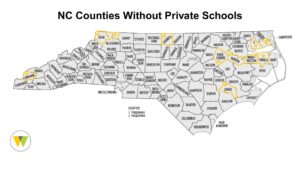By Amy Cockerham
Public Ed Works
TRENTON (April 25, 2025) – Leaders of rural North Carolina counties without any private schools are voicing concerns about the state’s school voucher program.
“Opportunity Scholarships” were created in 2014 and expanded last year to no longer have an income limit on who can apply. The scholarships use taxpayer dollars to pay tuition and fees for students to attend private schools if they choose.
Jones County is among 11 counties across the state without a private school. Jones County Public Schools Superintendent Dr. Bryce Marquis said 85 students that would go to his schools instead use the voucher program to attend a private school outside the county.
According to Marquis, the Jones County school district is the third-smallest in North Carolina. So, 85 students are about 8% of total enrollment. The school system is the largest employer in the county.
“Rural schools are the heartbeat of communities, and that’s across the United States, and especially North Carolina, and the voucher program really needs to be assessed and re-analyzed on the impact it’s having in rural school districts,” Marquis said.
He said if the funds provided for vouchers went to the county to support public schools instead, that would make a significant impact.
The North Carolina Department of Commerce ranks counties based on economic well-being, and the most distressed counties are ranked as Tier 1.
“We’ve just transitioned from a Tier 1 county to a Tier 2 county, which is a step in the right direction,” Marquis said. “But our budget not only on the school district level, but at the local, county government side is extremely low.”
Instead, the money is going into the hands of many parents who don’t need financial assistance.
“It’s really hard to comprehend how families that are making $260,000 a year can get a voucher reward,” Marquis said.
Rep. Renee Price, D-Caswell, agrees. Having attended both private and public school herself, she believes parents should have the choice to enroll in whatever school they want, but taxpayers shouldn’t pay the cost of private schooling, especially in another county.
“If your parents can already afford to send you to the school, why should taxpayer dollars be used to subsidize that education?” Price said.
According to a report from the N.C. Governor’s Office, only 83.3% of Caswell County’s kids are in public schools. The estimated loss of public school funding in the 2025-2026 school year is $92,000.
The Division of Non-Public Education says North Carolina is home to 881 private schools, none of which are located in Alleghany, Ashe, Camden, Caswell, Edgecombe, Graham, Jones, Martin, Perquimans, Tyrrell or Washington counties.
Sen. Kandie Smith, D-Edgecombe, serves on the Senate Education/Higher Education Committee and has spent time as a substitute teacher herself.
“I’ve had constituents in Edgecombe County say to me, ‘We don’t have any of these private schools. So, our taxpayer dollars go to fund something that does not even benefit our county, and that’s unfortunate,’” Smith said.
In Edgecombe County, 92% of kids are in public schools, and the estimated loss of public school funds in the 2025-2026 school year is $171,689, according to the report from the Governor’s Office.
Smith urges people who disagree with the way education funds are being used to speak up, especially to local lawmakers like herself.
“I think anything can change if the people want to change it,” Smith said. “It is up to the people, truly. It is up to the voters. If you’re not satisfied with what’s taking place, then your voice needs to be heard. That means we have 2026 elections. I encourage you to make sure that you are allowing your voice to be heard through your vote.”
For more information on school vouchers, check out our series highlighting this important issue.


Wanda Goyette says
This is a problem all over the country..These are Religous schools getting g these vouchers. If you want your child in one of these schools then pay for it yourself. I don’t want my tax dollars funding a Religious school. That’s what Church is for.
Avis Gray says
I don’t have a comment about this disconcerting issue, but I have a question. How much money does Martin County contribute to a private school located in another county?
Amy Cockerham says
Hi! The estimated loss of funding for Martin County is $65,270. Here is the full report. https://governor.nc.gov/north-carolina-voucher-fact-sheet/open. Hope this helps!